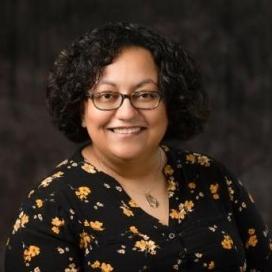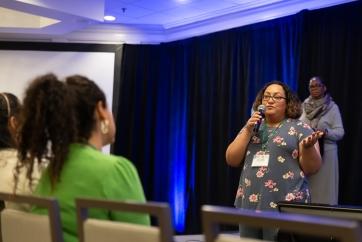Meet REVISE: Lisette Torres-Gerald
"Despite my passion for science, I couldn’t imagine myself in their shoes...I yearned to see someone like me discussing scientific concepts, demonstrating that I can also become a scientist."

We are excited to share our interview with Lisette Torres-Gerald, who is one of the co-principal investigators and the Director of Operations and Communication at REVISE.
What drew you to STEM and informal science?
Interest and representation
I remember spending my weekday evenings and Saturday mornings watching nature documentaries on television as a little Puerto Rican girl growing up in New Jersey. I was a dedicated viewer, making sure to watch as much as my parents would allow – from Shark Week on the Discovery Channel and documentaries featuring David Attenborough on PBS to Jack Hanna’s Into the Wild and Steve Irwin’s The Crocodile Hunter. I absorbed information about the biology and ecology of animals and shared the strange and interesting facts with my parents and sisters. In retrospect, this was probably really annoying!
I was envious of these men. They loved what they did and did it with purpose. They were able to travel everywhere in search of new and fascinating organisms to share with the world. They exposed me to a different way of thinking and being that did not exist in my small suburban world. I wanted to be just like them, explaining scientific concepts to the public in beautiful, exotic locations. They made science interesting and fun.
There was just one problem: I didn’t look anything like them. I was a young, trigeña (light brown) female with dark, curly hair. They were White men with straight hair over the age of forty. Despite my passion for science, I couldn’t imagine myself in their shoes. No one at school or in my family showed a profound interest in science, though I later discovered that my father dreamed of becoming a medical doctor before he was drafted to Vietnam. I yearned to see someone like me discussing scientific concepts, demonstrating that I can also become a scientist. As an adult, I am happy to see more faces of color in science popularization and communication, including Dr. Raven Baxter (the Science Maven), Dr. Neil deGrasse Tyson, and Dr. Danielle N. Lee. However, more can be done to diversify representations of scientists in informal science education spaces.
Seeing change in the informal STEM community
"I come to the informal STEM field as a critical scholar who examines science communication and the sociocultural aspects of science and science education, including how scientists of color engage in public intellectualism online."
My career has taken me from an aquatic ecologist to a science education researcher. I’m concerned about equity and social justice in STEM spaces. Throughout this transition, I have learned that scientists need to be trained in oral and written communication as well as relationship-building. They must be able to engage with a variety of publics with humility, clarity, and conciseness. This requires a deep understanding of how social identity, cultural competence, power, and privilege influence the effectiveness of science communication and engagement with their intended audience. I come to the informal STEM field as a critical scholar who examines science communication and the sociocultural aspects of science and science education, including how scientists of color engage in public intellectualism online.
I am interested in how scientists use social media to build community, share information, and educate others. I have also been thinking about extending my scholarship into the area of social network analysis. For example, my current work has led me to be recognized as a sponsored network leader for the Inclusive SciComm Symposium by the Metcalf Institute in addition to being the Director of Operations and Communication for the REVISE Center.
What are you most excited about or looking forward to accomplishing while working on REVISE?
It is hard to choose one thing! I am excited to work with a diverse team that has a similar view of equity and social justice as I do and are committed to equitably serving the ISE field. I also feel that my educational background, experiences, and skills align well with the mission of the REVISE Center. I am a natural bridge-builder: I love to connect people and provide them with the resources they need to reach their goals. I am a firm believer in modeling and practicing what you preach. Therefore, I am looking forward to developing an inclusive science communication strategy for the center and sharing that process with the field.

What do some of your current partnerships look like?
Co-conspirators and fellow dreamers
Besides my wonderful colleagues at TERC, I have co-conspirators and fellow dreamers that I collaborate with and who inspire me to continue my anti-oppressive equity work. For example, I am blessed to know and to dream with Daniel Reinholz, Cathery Yeh, and Paulo Tan . We theorize about disability justice in mathematics education. Daniel and I also started a website called Sines of Disability dedicated to the lived experiences of disabled mathematicians and mathematics educators.
I worked with Cynthia Bauerle, Laura Bottomly, and Carrie Hall (Program Director at the National Science Foundation) to create the Ethical Reasoning Instrument (ERITM). This digital resource instrument assists in the development of life sciences curricula that frame biology competencies in the context of ethical reasoning, since ethical and moral reasoning are important dimensions to college student development. Laura has been piloting the instrument in her engineering courses as well, and we are hoping to continue to pilot, assess, and scale-up the instrument to other STEM disciplines and institution types.
I have the honor of working with Tiffany Smith on the Native STEM Portraits project with Dr. Maria Ong), Dr. Nuria Jaumot-Pascual, Dr. Matthew Madison, Christina Silva, and Selay Zor. This project is a longitudinal study on the experiences of Native STEM students, faculty, and professionals and the barriers and supports they encounter in STEM.
My manuscript about disability and accessible science communication is in collaboration with Alyssa Paparella, Andrew Hundt, Madison McCall (Disabled in Higher Education), Ava Gurba, Syreeta Nolan, and Amanda Klingler (University of Denver). I serve as a mentor to younger disabled scientists who want to speak to their experiences and push science communication to think about disability. This is a motivated group of graduate students who have allowed me to work with them and share my knowledge and resources with them. For example, I played a small role with helping them organize Disabled Empowerment in Higher Education Month 2021 (#DEHEM21). This month-long Twitter event had a weekly theme specific to the disability experience of disabled students and scholars in higher education. I provided them with a couple of my slide decks on disability in higher education as well as promoted and participated in the event when I was able. I essentially did whatever they wanted me to help with!
Finally, I have the pleasure of working with Sunshine Menezes (Former executive director of the Metcalf Institute and Clinical Professor of Environmental Communication in the University of Rhode Island Department of Natural Resources Science) and Daniel Aguirre (Founder of Pueblo) on the Inclusive SciComm Symposium, where we are trying to support the inclusive science communication movement.
Additional partnerships
I have a number of additional partnerships, including:
- Sandy Ho (Borealis Philanthropy; Disability Intersectionality Summit): The founder of the Disability & Intersectionality Summit (DIS) and a disability policy researcher, Sandy keeps me apprised of things happening in the disability activist community and supports me personally and professionally.
- Naomi Ortiz (disabled Latina poet, artist, and author of the book Sustaining Spirit) and Jennifer White-Johnson (Afro-Latina disabled artist, designer, educator, and activist): We will be thinking about and collaborating on a project related to disability justice in STEM using arts-informed methodology.
- Roy Payan (blind Latino activist), Daniel Reinholz, Cathery Yeh, Paulo Tan: We co-authored a book chapter based on Roy’s experience as a plaintiff of the Payan v Los Angeles Community College District (LACCD) and the need for disability justice within mathematics and higher education.
- Nirmala Erevelles (University of Alabama), Federico R. Waitoller (University of Illinois at Chicago), and Helena Donato-Sapp (young Black girl scholar and activist): our conversation on disability justice in education was published as A Kitchen-Table Talk Against Ableism: Disability Justice for Collective Liberation
- Lissa Ramirez-Stapleton (California State University Northridge): She and I went to graduate school together and later decided to collaborate on an edited special Issue on disability justice, race, and education for the Journal Committed to Social Change on Race and Ethnicity (JCSCORE).
How do you build relationships and engage with community members?
"As a woman of color who believes in social justice praxis (i.e., walk the walk), I will only move toward creating a partnership if I feel like there is a potential for trust, honesty, and reciprocity. I always start with humility and being radically honest and transparent. I enjoy collaborating and co-constructing social justice initiatives with others. I try to be an active, compassionate listener, attuned to the needs and concerns of community members."
This question is difficult for me to answer because a lot of my community partnerships arise from burgeoning friendships. I also do not necessarily go around actively looking for partnerships either. In some ways, I feel like those kinds of practices objectify people.
I meet people in a lot of different types of education, activist, and mindfulness spaces that I connect with based on interests and a dedication to social justice. I spend time getting to know them and building trust. As a woman of color who believes in social justice praxis (i.e., walk the walk), I will only move toward creating a partnership if I feel like there is a potential for trust, honesty, and reciprocity. I always start with humility and being radically honest and transparent. I enjoy collaborating and co-constructing social justice initiatives with others. I try to be an active, compassionate listener, attuned to the needs and concerns of community members.
For example, it has been a joy being a part of the inclusive science communication community. I met Sunshine Menezes during her time as the executive director of the Metcalf Institute. The Institute invited me to be a part of the Inclusive SciComm Symposium back in 2019 after someone shared my dissertation topic on scientists bloggers of color and how they engage in public intellectualism. At the symposium, Sunshine was one of the first people to greet me. She wanted to know my thoughts around equity and inclusion, and she showed appreciation for my critical theoretical lens and perspective on disability justice. Sunshine sincerely wanted to see science communication grow to become more inclusive. I have helped with organizing and providing feedback on the Inclusive SciComm Symposium since then. In my time working with Sunshine, I know that she will support me as much as I support her.
What do you envision the role of the REVISE center to be in the informal science community?
The REVISE Center role should push the boundaries of the informal science education field regarding equity and inclusion while providing guidance and support to all of its practitioners, researchers, and evaluators. We must raise research questions from the field that amplify the voices of practitioners and marginalized communities in ISE research agendas. The role of the Center is to also catalyze and empower affinity groups and interest groups that result in authentic communities of practice around equity-centered practices. We aim to create an accessible, engaging, culturally responsive, and interactive website that is interesting and useful to the field.
Who would you like to see represented more?
I would like to see disabled people of color represented more at all levels of informal STEM education, from practitioners to researchers to learners.
Thank you to Lisette Torres-Gerald for taking the time to share her experiences in the informal science community and her work with the REVISE Center.